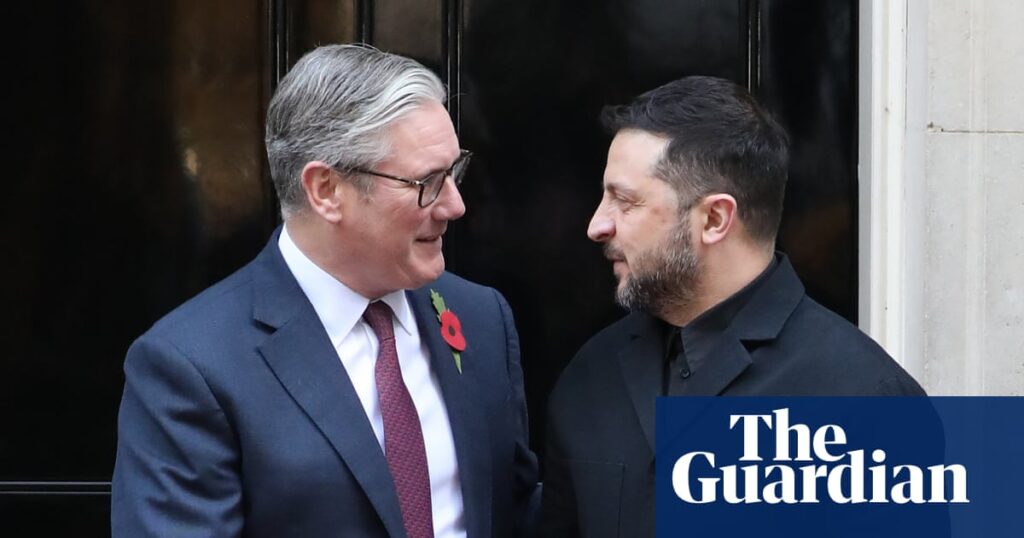Ukraine’s President Volodymyr Zelenskyy travelled to London on Friday for a meeting with more than 20 European leaders at a time when military and financial efforts to ramp up military and financial pressure against Russia are stalled or delayed.
The president participated in a hybrid gathering of the “Coalition of the Willing” hosted by the UK prime minister, Keir Starmer, to discuss “how they can pile pressure” on Vladimir Putin as Russia steps up its attacks on Ukraine’s electricity supply.
Starmer told the meeting he believed “there’s further we can do on capability, particularly … long-range capability”, an indication that the UK wants Ukraine’s allies to supply long-range missiles and help Kyiv strike Russian targets deep behind the frontline.
Earlier this week, Ukraine used a British Storm Shadow missile to bomb a Russian plant in Bryansk that produced explosives and rocket fuel. But the US has so far declined to supply Tomahawk cruise missiles, a proposal that has also prompted concern in Moscow.
Zelenskyy said that Russia was trying to cause a “humanitarian disaster” this winter, adding: “We’re thankful to you that we are not alone in this situation – from the very beginning of the war but especially now, it’s very important.”
Earlier, the Ukrainian leader visited King Charles at Windsor before heading to Downing Street for a one-on-one meeting with Starmer. The pair then moved to Foreign Office for the full meeting with European leaders.
Others attending in person included Mark Rutte, the Nato secretary general, plus Mette Frederiksen, the Danish prime minister, and Dick Schoof, the prime minister of the Netherlands. The remainder participated online.
The online and in person gathering comes a day after EU leaders failed to make a firm decision on whether to use €140bn frozen Russian central bank assets to fund Ukraine’s defence, while the relationship between the US president, Donald Trump, and Zelenskyy remains delicate.
Russia has, meanwhile, intensified its bombing of Ukraine’s energy infrastructure. Power and water were out in Kyiv and the northern city of Chernihiv this week, after targeted attacks aimed at breaking public resistance inside Ukraine.
Ahead of the meeting, Starmer accused the Russian president of wanting to prolong a war in which Ukrainian civilians were coming under attack. “From the battlefield to the global markets, as Putin continues to commit atrocities in Ukraine, we must ratchet up the pressure on Russia,” he said.
Two children were among seven people killed this week when a nursery in Kharkiv was directly hit by Russian bombing. Footage from the scene showed firefighters rescuing young children from a site that had been full with several dozen youngsters only a few minutes earlier.
after newsletter promotion
European leaders hope to capitalise on a slowly shifting mood at the White House. This week, Donald Trump called off a planned summit with Putin in Budapest, and on Wednesday imposed sanctions on Rosneft and Lukoil, Russia’s two largest oil companies.
The US president has also begun to call for a ceasefire along the existing frontlines, rejecting Russian demands for more territory in eastern Ukraine as a condition for ending the fighting. But he declined to agree to supply Tomahawk cruise missiles to Kyiv after a tense meeting with Zelenskyy in Washington a week ago.
Though Britain says it wants allies to step up the gifting of long-range munitions to ensure Ukraine can build on the chemical factory attack, it is unclear how far London would go to encourage Trump. With a range of over 1,000 miles, they could strike targets far beyond the Storm Shadow’s official range of 155 miles.
Britain placed Rosneft and Lukoil under sanctions in the middle of the month, but the EU has not done so largely because Lukoil supplies Hungary and Slovakia. Instead, the bloc’s leaders agreed a sanctions package, its 19th against Russia, that would gradually ban liquefied natural gas imports by the beginning of 2027.
Zelenskyy arrived in London after visiting Brussels. On Thursday, EU leaders sidestepped taking a decision on using Russia’s frozen assets to fund Ukraine’s defence, despite a plea from the Ukrainian president to take swift action to make Moscow pay for its war.


